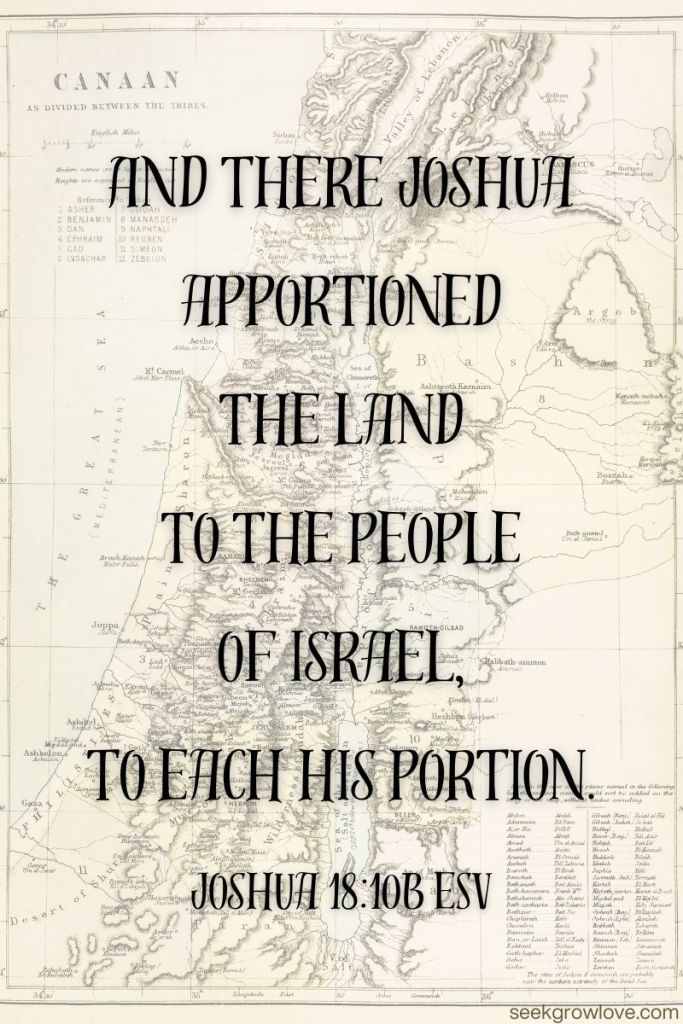
Old Testament: Joshua 17 & 18
Poetry: Psalm 51
New Testament: 1 Corinthians 8
It is obvious from reading the Old Testament and our reading in Joshua today that God talks about land as inheritance. A safe place for his people to dwell on the earth. Interestingly, He isn’t concerned about its financial value or acreage, interest, shiny jewel heirlooms, and all the rest that this world can throw at us as a concept of an inheritance. In Joshua, after decades of Israelites wandering and fighting, a generation dying, and all the excitement of the years since they left Egypt, we finally see them coming into their land, getting particular boundaries and instructions tribe by tribe. A promise fulfilled. But, wait. . . who had been promised the land? Who is missing in action in these chapters?
Well, one fellow comes to mind, and that is Abraham! I found myself wondering how many years had even passed since Abraham had been promised an inheritance of land figuring it had been “a while”. Umm…..a little history research clued me into the fact that it had been more than just “a while”. . . it had been more like 700 years! In Joshua 17-18, Israelites are receiving their inheritance that had been promised 700 years before. As we await Jesus’s return, and our inheritance, it is encouraging to remember. . . God DOES fulfill His promises in His time, in His sovereign design.
In the article “The Land Promise to Abraham and His Descendants” written by Anthony Buzzard and used with permission here, I loved to see how the idea of “land” was referenced as part of an entire plot of the Bible. Centuries more have passed since Joshua entered the promised land, and the Israelites certainly did not stay on the straight and narrow or even keep possession of the land, but the promise of land to Abraham was never broken because it was more than an area of particular ravines, slopes, and springs we see in these chapters. I’d recommend the full article found at https://focusonthekingdom.org/land.pdf to anyone and have included a few highlights to reflect on here:
“The entire biblical drama hangs on this remarkable tension: Abraham and his seed have never yet inherited the land/earth. In fact Stephen in the sermon which cost him his life (Acts 7, the longest chapter in that book) explicitly says that Abraham did not inherit as much as a square foot of the promised land! But “God promised it to him and his descendants”
“The fascinating fact is that Abraham has until this day not received a square foot of his inheritance. Acts 7:5 is a marvelous “John 3:16” verse! The point to be gained is that Abraham and all the faithful who are now dead, sleeping the sleep of death (Ps. 13:3), must at the future return of Jesus rise from the sleep of death (1 Cor. 15:23) to receive their promised inheritance.”
“There is coming a brand new world order on earth, to be inaugurated at the return of Jesus, and we are urged by the Gospel, the one Gospel about the Kingdom (Mark 1:14-15), to prepare with all urgency for that coming event.”
And who else will inherit the land God has promised? Thankfully that answer is woven through scripture and can include us. “Blessed are the meek, for they shall inherit the earth.” (Matthew 5:5)
-Jennifer Hall
Questions:
- What do you like best about the idea that you can be an heir to the promised land?
- What encouragement do you find here in Joshua 17-18 seeing God fulfill promises in His time?
- How does the Biblical idea of receiving a perfect promised land after Jesus returns and the dead are resurrected contrast with some common beliefs of what happens after we die?










